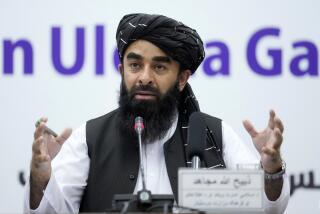In This Crisis, Avoid Giving Away the Store to Pakistan
- Share via
In its efforts to seize Osama bin Laden, presumed to be in Afghanistan, the United States is once again forging an alliance with Pakistan.
But before conceding too much to achieve Islamabad’s cooperation, the U.S. should examine the lessons of the past decade. While making common cause now with the U.S. against the Taliban, Pakistan has been closely linked to the Taliban in the past and shares responsibility for Afghanistan’s current state of crisis.
During the Soviet-Afghan war of the 1980s, Pakistan had maintained close relations with the Pushtun moujahedeen group that belonged to the more radical Hezb-i-Islami. Thus these groups received most of the military and financial assistance channeled through Pakistan. Saudi Arabia, one of the major providers of aid to the Afghan resistance, had been engaged with Pakistan in a cultural and religious transformation of Afghanistan, especially by undermining the country’s indigenous Hanafi Islam and Sufi traditions and spreading the more rigid Wahhabi teachings. The Taliban is the most formidable product of this strategy.
The collapse of the Soviet Union meant that a subservient government in Afghanistan was even more important for Pakistan, which now wanted to use it as a conduit to Central Asia. Additionally, Pakistan and Saudi Arabia wanted to prevent Iran from having more access to Central Asia through links with Persian-speaking people in Afghanistan and Tajikistan. Yet after the Russian-backed Afghan government of Najibullah fell in 1992, Pakistan’s plans were thwarted because Ahmed Shah Masoud, an ethnic Tajik--not Pakistan’s favored commander--was the first to enter Kabul. (Masoud was killed shortly before the attacks on the U.S.)
Then, in 1994, the Taliban made its appearance and in four years succeeded in subduing the opposition and capturing nearly 90% of Afghan territory. From the start, the Taliban imposed a harsh policy based on a narrow interpretation of Islam and aimed at destroying Afghanistan’s historic traditions. Yet not until the 1998 bombings of U.S. embassies in Kenya and Tanzania and the link with Bin Laden did the international community begin to pay attention.
Throughout, Pakistan denied having had anything to do with the rise of the Taliban. No one asked how a group of religious students who had not fought in the Soviet-Afghan war could handle sophisticated weapons and defeat veterans of a long struggle without solid military support from somewhere.
Pakistan is not responsible for all of Afghanistan’s problems. Many internal and external factors, including the interference of Afghanistan’s other neighbors, have contributed. But given the extent of Pakistan’s involvement, it bears a large share of responsibility.
Apprehending Bin Laden and destroying his murderous network will not be possible without Pakistan. On the other hand, Pakistan has a stake in seeing this terror network eradicated, so Islamabad should not be given carte blanche in deciding Afghanistan’s future. Specifically, the U.S. should not agree to not deal with the anti-Taliban Northern Alliance. This would perpetuate conditions that could nurture new brands of extremists and would strain U.S. relations with India and perhaps Russia.
Restoring stability in Afghanistan means striking a new bargain among the country’s ethnic and political components--which could include moderate elements within the Taliban--and restoring its position as an independent country that has peaceful relations with all its neighbors.
More to Read
Sign up for Essential California
The most important California stories and recommendations in your inbox every morning.
You may occasionally receive promotional content from the Los Angeles Times.













